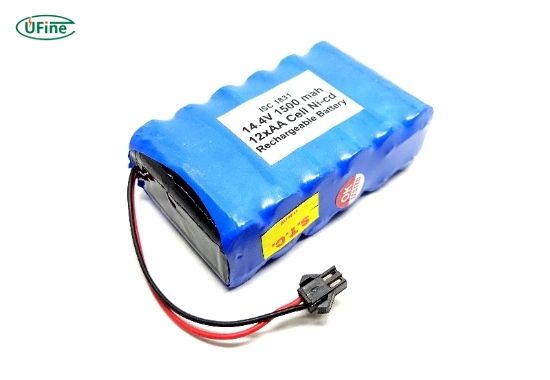A 14V battery is a rechargeable power source that delivers slightly more voltage than a standard 12V battery. It offers better performance for tools, electronics, and vehicles that need extra power without the bulk of higher-voltage systems. This makes it a versatile choice for users looking for enhanced energy output in a compact form.
From powering professional tools to being used in advanced automotive systems, the 14V battery is becoming more common across industries. In this article, we’ll explore in depth what a 14V battery is, how it works, what makes it different from other batteries, and why it’s gaining popularity.
Part 1. What is a 14v battery?
A 14V battery is rechargeable with a nominal voltage of 14 volts. It is designed to deliver more power than standard 12V batteries, making it suitable for applications where a higher voltage is beneficial but where 18V or 24V systems may be excessive in size, cost, or weight.
These batteries are typically made from lithium-ion cells. However, other chemistries like nickel-metal hydride (NiMH) and lead acid are also used in specific contexts. Four lithium-ion cells in series (each around 3.7V) produce a nominal 14.8V, which is commonly rounded down to 14V.
Part 2. How does a 14v battery work?
A 14V battery stores electrical energy in electrochemical cells and releases it as direct current (DC) electricity when needed. Each cell contributes to the total voltage of the battery. In a lithium-ion configuration, four cells are connected in series to form a combined voltage of about 14.8V.
When the battery is used, electrons flow from the negative terminal through the connected device to the positive terminal, producing a current flow. When charging, this process is reversed. Advanced models include battery management systems (BMS) to ensure safe charging, discharging, and protection against overheating and overcurrent.
Part 3. Types of 14v batteries
There are several types of 14V batteries, each with unique characteristics:
1. Lithium-ion (Li-ion)
Voltage per cell: ~3.7V
Pros: High energy density, low self-discharge, lightweight, long life
Cons: Sensitive to overcharge/heat, needs protection circuitry
2. Nickel-metal hydride (NiMH)
Voltage per cell: ~1.2V
Pros: Environmentally friendly, safer than lithium
Cons: Heavier, lower energy density, memory effect
3. Lead-acid
Voltage per cell: ~2.0V
Pros: Affordable, robust, high surge current
Cons: Heavy, short cycle life, slower charging
Lithium-ion batteries are the most common in modern 14V systems due to their superior performance and efficiency.
Part 4. Key features of a 14v battery
What makes a 14V battery stand out? Here are its key features:
- Higher Voltage Output: Delivers more power than 12V systems, ideal for devices needing extra energy.
- Compact Design: Offers a balance between power and portability.
- Rechargeable: Can be recharged hundreds or even thousands of times.
- Fast Charging: Especially with lithium-ion chemistry.
- Integrated Protection: Advanced models include protection against overcharging, short circuits, and overheating.
- Long Lifespan: Lithium-ion versions can last 3–5 years or more with proper care.
- Stable Voltage: Provides a consistent energy supply even during heavy use.
Part 5. Applications of a 14v battery
A 14V battery is used in a wide range of fields. Some of the most common applications include:
1. Cordless Power Tools
Many mid-range cordless tools such as drills, impact drivers, and saws use 14V batteries to provide sufficient torque and runtime without becoming too bulky.
2. Automotive Systems
Some advanced car electrical systems, especially start-stop systems and hybrids, operate at voltages slightly above 12V to improve fuel efficiency and reduce load on alternators.
3. Drones and RC Equipment
The lightweight yet powerful nature of 14V lithium-ion batteries makes them perfect for drones, remote-controlled cars, and airplanes.
4. Consumer Electronics
High-end cameras, laptops, and communication gear often use 14V packs for extended portability.
5. Solar Energy Storage
In small solar setups, 14V batteries are used to store energy from solar panels for use at night or during cloudy weather.
6. Medical Equipment
A 14V battery provides a stable and efficient power supply for portable medical devices like infusion pumps or mobile monitoring systems.
Part 6. Advantages of using a 14v battery
Using a 14V battery offers several benefits:
- Increased Power Output: More voltage means more power for demanding devices.
- Lightweight Design: Especially with lithium-ion versions, lighter than lead-acid batteries.
- Improved Efficiency: Less voltage drop under load compared to 12V systems.
- Longer Runtime: Higher energy density means devices run longer between charges.
- Reduced Charging Time: Many 14V batteries support rapid charging technologies.
- Better Performance in Cold Weather: Lithium-ion 14V batteries perform better in low temperatures than lead-acid batteries.
These benefits make 14V batteries a smart upgrade for users who want more power without significantly more weight or size.
Part 7. How does a 14v battery compare to 12v and 18v?
Key differences:
- Voltage: A 14V battery provides a higher voltage than a 12V battery, producing more torque and power. However, it offers slightly less than an 18V battery, which is often used for heavy-duty tasks.
- Weight and Size: 14V batteries are generally lighter and more compact than 18V models, making them easier to handle.
- Runtime: While 18V batteries may offer longer runtime, 14V batteries strike a good balance between performance and convenience.
- Application Fit: 12V is ideal for light-duty, 14V for medium-duty, and 18V for heavy-duty professional tools.
Comparison Table
| Feature | 12V Battery | 14V Battery | 18V Battery |
|---|---|---|---|
| Nominal Voltage | 12.0V | 14.4V – 14.8V | 18.0V – 18.5V |
| Typical Use | Small tools, electronics | Medium power tools, cameras | Heavy-duty tools, equipment |
| Weight (Li-ion, 3Ah) | ~0.7 kg | ~0.9 kg | ~1.2 kg |
| Runtime (3Ah battery) | ~30–40 mins | ~45–60 mins | ~60–75 mins |
| Torque Output (tools) | Low | Medium | High |
| Charging Time | 60–90 mins | 50–70 mins | 60–90 mins |
| Price Range | Low | Medium | High |
If you need a balance between power and portability, the 14V battery is often the best option.
Part 8. What to look for when buying a 14v battery?
When choosing the right 14V battery, consider the following:
- Battery Chemistry: Lithium-ion is the best choice for most modern uses.
- Capacity (Ah): Determines how long the battery can run before it needs recharging.
- Voltage Compatibility: Ensure your device is built to handle 14V input safely.
- Charge Time: Fast-charging models save you time.
- Brand Compatibility: Make sure the battery fits your tools or devices.
- Cycle Life: Check how many charge/discharge cycles the battery can handle.
- Built-in Protection: Look for short-circuit, overcharge, and thermal protection.
Choosing a reliable and well-reviewed brand is crucial for safety and performance.
Part 9. How to properly maintain a 14v battery?
Proper maintenance extends battery life and ensures safe operation:
- Avoid full discharges: Try to recharge before the battery is empty.
- Use the right charger: Chargers not designed for 14V batteries may cause damage.
- Store in cool places: Avoid direct sunlight and high temperatures.
- Don’t overcharge: Remove the battery once it’s fully charged.
- Keep it dry: Water exposure can permanently damage internal circuits.
- Cycle it regularly: Batteries that sit too long and unused can degrade faster.
With good care, a 14V lithium-ion battery can last up to 5 years or 1000+ charge cycles.
Part 10. Can a 14v battery replace a 12v battery?
Sometimes, yes. If your device tolerates higher input voltages (some do), a 14V battery can offer longer runtime and better performance than a 12V alternative. However, using a 14V battery in a system strictly designed for 12V can damage components or void warranties.
Always check your device specifications or consult the manufacturer.
Part 11. FAQs about 14V battery
What devices typically use a 14v battery?
Devices like cordless drills, digital cameras, drones, and some automotive systems frequently use 14V batteries because they balance power and size.
Can I charge a 14v battery with a 12v charger?
No. A 12V charger may not provide enough voltage to charge a 14V battery fully and could even damage it. Always use a compatible charger.
How long does a 14v battery last?
With regular use and proper care, a 14V lithium-ion battery can last 3 to 5 years or up to 1000 charge cycles.
Is a 14v battery safe?
Yes, most modern 14V batteries have built-in safety features like overcharge protection, thermal monitoring, and short-circuit control, especially in lithium-ion variants.
Is a 14v battery better than an 18v battery?
It depends on usage. 14V is lighter and more compact, making it ideal for medium-duty tasks. If you need more power consistently, 18V may be better.
Related Tags:
More Articles

How to Choose the Best Floor Scrubber Battery for Commercial Cleaning?
Selecting the ideal floor scrubber battery ensures a long runtime, rapid charging, and minimal maintenance for efficient commercial cleaning operations.
Battery for Blower vs Battery for Leaf Vacuum: Which One Should You Choose?
Battery for blower vs leaf vacuum—learn the key differences in power, fit, and runtime to choose the right battery for your outdoor tool needs.
How to Choose the Right Battery for Blower?
Choosing the right blower battery? Consider voltage, capacity, chemistry & usage. This guide helps match the best battery for peak performance.
How to Choose the Best Insulated Battery Box for Lithium Batteries?
Choosing the Best Insulated Battery Box for Lithium Batteries? Discover key factors such as size, material, and safety for optimal protection and performance.
7 Critical Elements on a Lithium Battery Shipping Label
What must be on a lithium battery shipping label? Learn 7 key elements to ensure safety, legal compliance, and correct handling across all transport modes.






